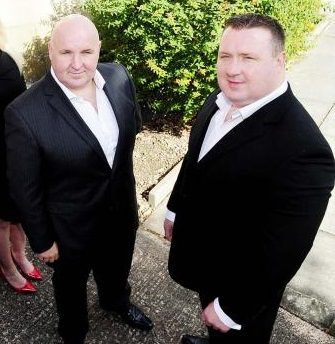Global Edge (a trading name of UK Innovative TI Ltd) offers unregulated bonds paying interest for a three year term as follows:
- 12.5%pa for investments between £2k and £25k
- 16.5%pa between £25k and £50k
- 18.5%pa between £50k and £75k
- 21%pa above £75k
Funds raised are to be used to gamble on various sports. Global Edge claims to have “advanced algorithmic technology” which identifies when bookmakers have priced their odds incorrectly and a platform which automatically bets on markets where it has an edge.
Global Edge promotions claim their system is
non-correlated to the economy, which means you can earn consistent profits regardless of Brexit and other economic conditions.
Global Edge is currently reportedly being promoted via the New Scientist magazine’s mailing list.
Global Edge’s adverts are approved for regulatory purposes by WDFS Limited.
Who are Global Edge?

Global Edge is headed by serial entrepreneur Iain Stamp. According to Stamp’s bio in the brochure:
As an INTJ, Iain is one of the rarest and most strategically capable personality types. The INTJ form just two per cent of the population.
INTJ refers to a Myers-Briggs personality type (Introverted, iNtuitive, Thinking, Judging). This is the first time I can recall that someone has used the results of a multiple choice personality test as a selling point to investors. Maybe the next time I’m presenting my credentials I should mention that I’m in the two per cent of the population that has webbed feet.
Not mentioned in Stamp’s CV is his firm Integrity, which sold Geared Traded Endowment Policies and went into liquidation in 2009 causing up to £80 million in losses.
Also not mentioned is PPF Capital Source, a peer-to-peer investment scheme controlled by Stamp which according to the Times in October 2017 was subject to complaints in the UK and Ireland over €5 million of missing money. Stamp stated that the complainants had been the victim of fraud by a third party.
UK Innovative TI Ltd fails to disclose who is in ultimate control via Companies House, having submitted a “persons with significant control statement” in January 2019 that says “The company has identified a registrable person in relation to the company but all the required particulars of that person have not been confirmed”.
Back in 2016 UKITI submitted an annual return which confirmed that its shares had been transferred to a “Galaxy Funding Foundation”.
Who they? According to a High Court document from the PPF Capital Source affair,
The issued shares of the company are wholly owned by the Galaxy Funding Foundation, which is registered in Belize as what is called a Belize International Foundation, described in the material before me as a hybrid between a trust and a company.
According to Mr. Stamp he is not a shareholder in or beneficiary of that entity and has no control over it. […] He has produced the registration documents and foundation 31 charter of the Foundation but these documents as produced contain significant unexplained redactions. The governing body of the Foundation is stated to be its Foundation Council but the name of the sole member of that Council has been redacted. The Foundation has a protector who appears to fulfil broadly the same role as a typical protector of a settlement but that name has also been redacted. The charter does confirm that Mr. Stamp was the founder of the Foundation, that he cannot be a member of its governing body and that there are no named beneficiaries, the purpose of the Foundation being stated as the advancement of education to promote, sustain and support the physical education of young people and life skills training.
So, in short, investors are lending money to a company set up in 2009 by Iain and Katrina Stamp, which is owned by a foundation in Belize also set up by Iain Stamp, but the people in ultimate control of Global Edge are not disclosed. But they definitely aren’t Iain Stamp. All we know about them is that they are interested in “the physical education of young people”.
Investors should think very carefully before investing with a company that does not disclose full details of the people in ultimate control.
How safe is the investment?
These investments are corporate loans and if Global Edge defaults you risk losing up to 100% of your money.
Global Edge’s claim that its gambling investment is “non-correlated to the economy” is true in a sense, but means that like any loan to a small company, the investment can easily generate a 100% loss even as the world economy goes up.
Global Edge’s brochure claims that in live testing from February 2018 to February 2019, the algorithm turned £20,000 into £5,277,694, which Global Edge says is a “4,012% return”. I make that a 26,288% return, but seriously, who’s counting. Global Edge does correctly calculate that this amounts to a 59% per month compounded growth rate.
Had Global Edge successfully sustained its return of 59% per month indefinitely, it would own every penny of the world’s $300 trillion wealth in less than 3 years of betting on sport with its initial £20,000. That’s the magic of compounding.
Thankfully the directors do not insult investors’ intelligence by pretending they can sustain growth rates of 59% per month. Apparently there are “liquidity constraints on some of the markets that the platform trades on”.
Instead they say “However, the directors expect the platform to make between 5% to 10% ROI per month on its bet turnover. Expected compound growth rates in the range of 15% to 25% per month are realistic.”
Which raises several questions, the most obvious of which is: how stingy are Global Edge to have an algorithm which generates returns of 80% to 213% a year (with 435% to 1,355% “realistic”), a rate of return which, if it’s as sustainable as they claim, will make its owners billionaires within years, and yet only share up to 21% per year with the people fronting the money?
In the “Investor Comforts” section of its website, Global Edge states
Following comprehensive due diligence, a global private equity investment group valued Global Edge at £20,000,000 the private equity investor has committed to provide £3,000,000 of investment. [sic]
Note that Global Edge waffling on about unnamed private equity firms is not a substitute for investor due diligence.
That aside, why are Global Edge bothering with trying to raise £10 million from random investors via adverts in the New Scientist, when they can use the £3 million invested by the unnamed private equity firm, and for that matter the £5 million they made in beta, and turn it into £10 million in a matter of months?
Despite putting up £3 million, the private equity firm is clearly sceptical about Global Edge’s claims if they value an algorithm allegedly capable of generating 5% – 25% annual returns as worth only £20 million.
Asset-backed lending
Also listed under “Investor comforts” is that “Bonds are backed with a 1st Legal Charge over the Company’s assets”.
Secured lending is not risk-free as there is a risk that if the underlying borrower defaults, the security cannot be sold for enough to cover the loan.
What Global Edge’s algorithm will be worth if it has defaulted on its bond will be extremely uncertain, given that if Global Edge runs out of money to pay investors, its predicted returns will have proved overoptimistic.
Investors in asset-backed loans have been known to lose 100% of their money when it turned out that there were not enough assets left to pay investors after paying the insolvency administrator (who always stands first in the queue).
We are not in any sense implying that the same will happen to investors in Global Edge, only illustrating the risk that is inherent in any loan note even when it is a secured loan.
If investors plan to rely on this security, it is essential that they hire professional due diligence specialists (working for themselves, not Global Edge) to confirm that in the event of a default, the assets would be valuable and liquid enough to compensate all investors. Investors should not simply rely on what Global Edge tells them about their assets.
Should I invest in Global Edge?
This blog does not give financial advice. The following are statements of publicly available facts or widely accepted investment principles, not a personalised recommendation. Investors should consult a regulated independent financial adviser if they are in any doubt.
As with any individual loan note to a small unlisted company, this investment is only suitable for sophisticated and/or high net worth investors who have a substantial existing portfolio and are prepared to risk 100% loss of their money.
As an individual, illiquid security with a risk of total and permanent loss, Global Edge’s loan notes are much higher risk than a mainstream diversified stockmarket fund, despite its claim to offer “consistent profits regardless of economic conditions”.
Before investing investors should ask themselves:
- How would I feel if the investment defaulted and I lost 100% of my money?
- Do I have a sufficiently large portfolio that the loss of 100% of my investment would not damage me financially?
- Have I conducted due diligence to ensure the asset-backed security can be relied on?
There is no betting algorithm that consistently and scalably generates returns of 21% per year after costs, let alone the 5-25% a month that Global Edge claim. If Global Edge had one they would be quietly turning their own £5 million into a billion-pound fortune, and not dilute their returns by soliciting investment from others.
The reality is that investing in a bond paying 21% per year is a pure gamble – and one where someone else holds all the cards. Isn’t betting supposed to be fun?
Do not invest unless you are prepared to lose all your money.













